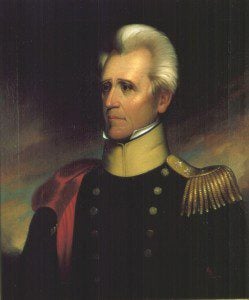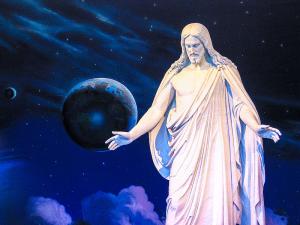
Trump can learn from his hero and reject a fusion of Church and State.
Among the Religious Right, the idea that America is a secularized, atheistic wasteland has become an article of faith. From annual jeremiads about the “War on Christmas” to lamentations about prayer in schools, conservative Christians portray the country as a prodigal nation that has strayed from its faith-based roots.
President Trump has pandered to this religious discontent, proclaiming that his America will “start saying Merry Christmas again” and arguing (falsely) that the Obama Administration favored Muslims over Christians when admitting refugees. More recently, Trump vowed to abolish the Johnson Amendment, an LBJ-era law that forbids churches from engaging in partisan politics.
Trump’s efforts to cloak himself in robes of Christian nationalism have paid off. Exit polls show that 80% of evangelical voters supported him, and he earned, despite his hedonistic lifestyle, the endorsement of “Moral Majority” leaders like Pat Robertson and James Dobson. But while Trump has benefited from his opportunistic marriage to the Christian Right, if he wants to avoid further turmoil in his already-chaotic administration, he should look to the example of his hero Andrew Jackson in rejecting a fusion of Church and State.
Jackson, America’s controversial seventh president, was a religious man. His writings are peppered with references to deity, and he regularly attended church. But though he nurtured a personal connection to the divine, he was a staunch opponent of mixing Church and State. In fact, his advocacy for the Establishment Clause was absolutist – he once argued for the “complete separation [of religion] from the political concerns of the General Government” (emphasis added).
Jackson’s antipathy to mixing faith and politics went beyond mere words. When asked by Henry Clay to fend off a cholera outbreak by declaring a national day of prayer and fasting, Jackson adamantly refused, believing such a proclamation unconstitutional. His supporters in Congress, when faced with a proposal to stop mail delivery on Sunday, condemned the proposition as one which would “retard . . . the advancement of our country.” And around three years before his presidency, he refused to join a church, stating that he did not want to exhibit his religiosity for “political effect.”
Jackson’s staunch secularism was one of the few redeeming qualities in a man and presidency that were otherwise lackluster, if not outright horrifying. Jackson was an unabashed racist who refused to enforce Supreme Court rulings, led the country into a disastrous recession, and, perhaps most damning, endorsed the ethnic cleansing of Native Americans from Southern states. His was also a presidency immersed in conflict and dysfunction, with warring power centers often threatening to tear his Cabinet apart.
But despite his failings and the monstrous consequences of his actions, Jackson’s avowed secularism helped cement the primacy of Church-State separation that made America what it is today. During his administration, Jackson confronted the machinations of Reverend Ezra Stiles Ely, a popular Philadelphia minister who fiercely argued for a “Christian Party” whose electoral dominance would bar “Pagans,” Muslims, deists, and Unitarians from political office. The America that Ely envisioned would be a theocracy in which civil rulers would “act a religious part in all the relations which they sustain.”
A theocracy like the one Ely proposed could have torn America apart, pitting non-traditional Christians, Catholics, and others against Ely’s evangelical Protestants. An America that already contended with strong regional rivalries, disputes over slavery (which would later erupt into civil war), and racial tensions could ill afford religious cleavages dividing the body politic. Jackson’s unwavering embrace of secularism helped avert religious conflict in his day and set the stage for a religious pluralism which would later embrace Catholics, Mormons, Muslims, Hindus, and others as “authentic” Americans.
Trump, or at least his chief strategist Bannon, has claimed the legacy of Jackson as his own. The President recently made a pilgrimage to the tomb of “Old Hickory” in Tennessee, prominently displays a portrait of Jackson in the Oval Office, and has adopted Jacksonian language in portraying himself as the embodiment of the “will of the people.” Jackson’s many faults, and monstrous, genocidal behavior, make his embrace by Trump troubling. But if Trump can embrace Jackson’s secularism, and jettison the Christian nationalism that he has seemed to espouse, he can avert the religious discord that Jackson’s actions helped prevent.











